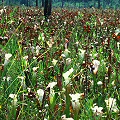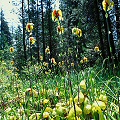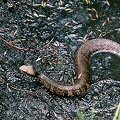Q: Where can I see wild carnivorous plants?

Alabama

California

Cottonmouth
A: If you have the energy, you can probably find them within a day's drive.
In the USA, carnivorous plants such as Utricularia
occur in every state, although most are found in the southeastern coastal states.
California and Oregon also do especially well, with four genera of carnivorous
plants (Darlingtonia, Drosera, Utricularia, and Pinguicula).
In Europe, Pinguicula and Drosera are readily accessible, too.
Despite the fact that wild carnivorous plants are so close,
if you want to see them you may find it surprisingly
hard to locate them. There are two reasons for this.
First, in our own thoughtlessness, we have destroyed most of the habitats that once had carnivorous
plants.
Second, with so few sites remaining you have to find out exactly where to go to
see the carnivorous plants that are left. But you may discover that the
very people you would like to get information from,
preserve managers and government officials, may be unwilling to give
this to you. This is because so much poaching of carnivorous plants has
occurred they are probably going to distrust you. Good luck trying to convince
them you are honest--preserve managers have been made angry many times by
poachers. I sympathize both with them and with you. It is an unfortunate situation.
I have seen lots of
evidence of poaching during my own field work, and it gets me furious.
It is not easy to find out how to see carnivorous plants, but I have been compiling a short
(but slowly growing) list of boardwalk-style sites where you can
see them. Since carnivorous plants grow in clean, unspoiled locations,
even if you are unsuccessful with your search you are usually guaranteed a pleasant time
searching. Remember to be wary of suspicious locals, venomous snakes,
urushiol-coated plants, dangerous bogs, and
blood-sucking insects!
If you get killed on your trip, don't complain to me afterwards!
Other than the places on the list I mention above, I will not reveal site location.
Poachers, you know? You never can be sure where they lurk. You will not get site information from the
International Carnivorous Plant Society, for the same reason.
If you hear of places where you can see plants, make sure you don't violate any laws on your
trip! No trespassing, no poaching. But I sadly warn you---if you take a trip to visit a site that
someone tells you about, like road-marker blah-blah on highway blah-blah, the sad truth is that tips
much older than five years are often unreliable. Land development is gobbling up what is left.
If you merely want to see any carnivorous plants, you will probably be more
successful seeing plants in cultivation.
Page citations: Rice, B.A. 2006a; personal observations.